
As a digital marketing analyst at Altimeter, I’ve been tracking the ever-changing world of content marketing since 2013, but this is the first year where the changes have been truly dramatic.
When I fielded the survey for my latest research report “The 2018 State of Digital Content,” I expected to find small technological advances in the way we create, deliver, and measure content marketing, but not much else. Instead, I found a fundamental shift in the entire practice of content marketing.
Companies are now using content to do more than create awareness or brand health. They’re using it to directly drive revenue, become more cost-efficient and personalize the customer experience. Which is to say, they’re using content marketing to do far more than marketing.
Here are five key findings from the survey that highlight this shift. We deployed the survey in August 2018, with 400 respondents across North America, Europe (France, UK and Germany) and China, from companies with at least 1000 employees.
Content Trend #1: Most Companies Can Prove the Business Impact of Content
Despite the popularity of content marketing as a practice, companies have traditionally had a hard time proving its positive financial impact, relying instead on softer metrics such as brand awareness and brand health. However, in our survey, 81% of companies agreed or somewhat agreed they were able to directly tie revenue generated by content.
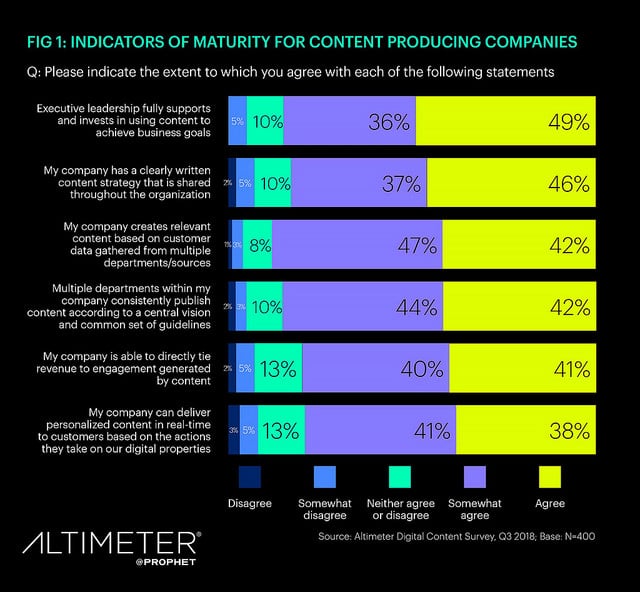
Furthermore, when we asked companies about their top challenges, only 9% said they had difficulty proving the impact of content.
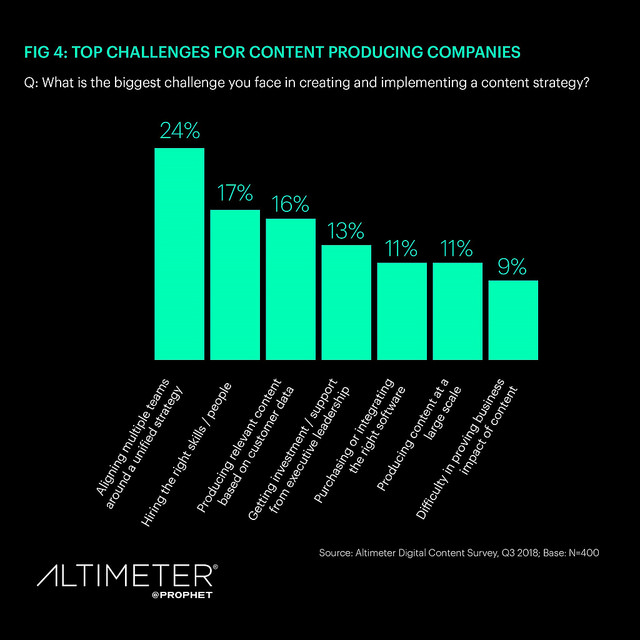
These findings raise the bar on expectations of all content marketing teams, because they now have to prove definitive impact on revenue, and can’t afford to continue focusing on brand awareness and health. The good news is we’re coming up with better ways to measure the impact of content, and better tools to do it with.
Content Trend #2: Interactions Are Better Performance Metrics than Reach
When we first conducted the survey in 2016, reach (37%) and engagement (36%) were the most popular ways to measure the performance of content. In 2018, while engagement (defined as clicks, comments, or shares) is still favored as the top metric (30%), reach (12%) is far less popular. Instead, companies are using more financially-focused metrics such as efficiency (23%) and conversions (23%) to measure the success of their content strategies.
Engagement is the #1 most popular way to measure the performance of content.
Click To Tweet
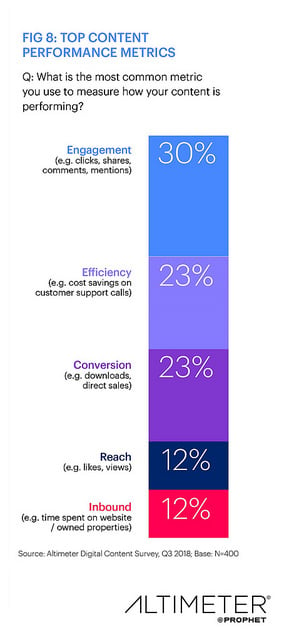
This is another sign of the higher expectations of content, and the ways companies are deploying it to save money, generate leads or drive people closer to purchase, rather than simply using it as a way to distribute brand messages at scale.
Content Trend #3: Product-Focused Content Outperforms Thought Leadership
In news that will be disturbing to a lot of marketing and communications professionals, our survey found that product-focused content (29%) outperformed all other types of content, including thought leadership or subject matter expertise (25%), brand-focused content (18%), or company-focused content (17%) designed to promote transparency and loyalty.
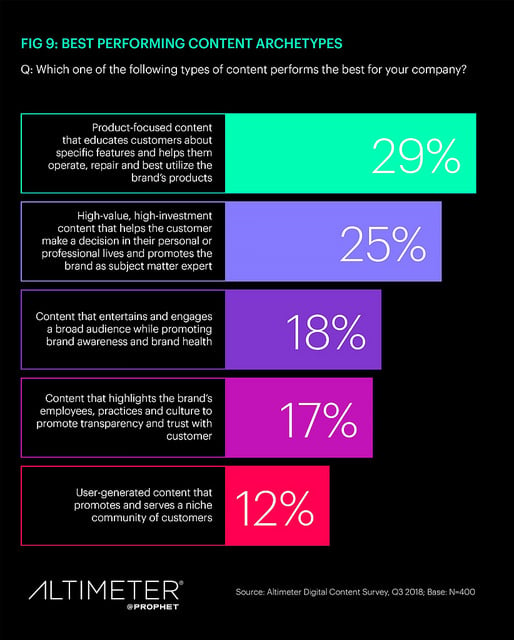
This is notable because it would indicate that customers prefer the one type of content that is least likely to be produced by a PR or content marketing team. However, the results did change when we split the findings by industry. Thought leadership performed better for service industries such as healthcare, finance and technology, whereas retailers and manufacturers found product-focused content to be the best. This implies that companies with physical goods should prioritize content about their products, while companies that sell services can win by providing helpful content that establishes them as an industry authority.
These results should force every content marketing team to evaluate its strategy and ask itself if it’s truly serving the customer’s needs with content, or if it’s serving the needs/or bias of a single department.
Content Trend #4: Short-Form Video Is the Best Performing Content Format
It’s no surprise that video is a highly engaging format for content, but our report showed that it was the best performing content (in terms of engagement) across every industry and every geography. In particular, short-form video, which is less than two minutes, was the top performer, followed closely by static images. It emphasizes the point that investing in visuals is a solid bet for content in 2019, given how ubiquitous it has become on social media channels and mobile.
A new study by @altimetergroup found that short-form video is the best performing #content format
Click To Tweet
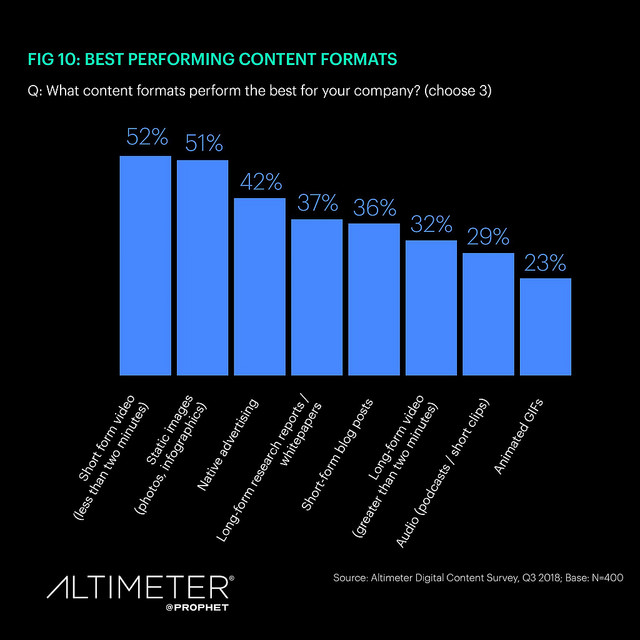
5. Data and Technical Expertise Are Preferred Over Creative Skills
Despite the high-scoring engagement of video and visuals, we were surprised to find that creative skills, such as video editing (16%) and graphic design (22%), were at the bottom of the list of desired talents. Instead, data analysis (41%), project management (39%) and marketing automation expertise (37%) were the most sought-after skills for new hires in 2019. Could this signal the wholesale replacement of Mad Men with “Math Men”?
Data analysis is the #1 most desired skill for new content team hires.
Click To Tweet
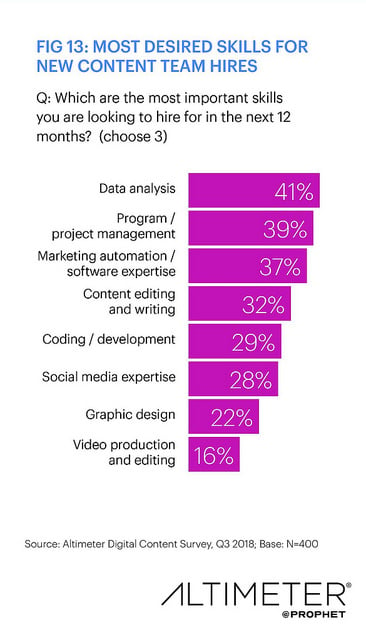
Part of the explanation could be the overabundance of creative, relative to the specialized roles of data analyst and marketing software operator, which drives demand for the latter. Additionally, large companies are more likely to have agency partners to which they can outsource creative work while focusing on the technical processes in-house. Regardless, it shows the shift of content marketing from being a practice that was similar to advertising and PR (highly creative, no direct revenue attribution), to a practice that’s commercially focused, and increasingly sophisticated with its use of data for personalization.
The post Your 2019 Content Strategy: 5 Trends You Can’t Ignore appeared first on Convince and Convert: Social Media Consulting and Content Marketing Consulting.
from Convince and Convert: Social Media Consulting and Content Marketing Consulting https://ift.tt/2SMXQUh



No comments:
Post a Comment